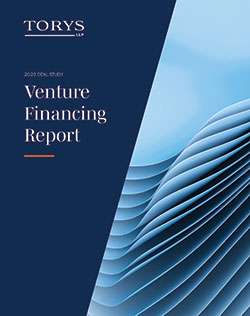


Authors

Torys’ Emerging Companies and VC Group
In 2022, Canadian venture capital was largely defined by corrective effects in the market following record levels of activity in the year prior. Consequently, we saw fewer financings and at lower valuations than in the previous two years. Despite the overall slowdown in VC deals, earlier stage financings saw a continuing increase, and as this year progresses, we will likely see exciting companies and investment opportunities emerge in fintech, clean energy, AI and SaaS.
Read our third annual study examining Canadian VC financings across 159 Canadian-headquartered startups.

In 2022, Canadian venture capital was largely defined by corrective effects in the market following record levels of activity in the year prior.
Canadian venture-backed companies were hardly alone in this phenomenon, as businesses across the world responded to increased interest rates, rising inflation, supply chain issues and global unrest. Companies were faced with the choice to cut costs or accept financing in smaller amounts or on less favourable terms than in the recent past. Consequently, we saw fewer financings and at lower valuations than in the previous two years.
While the movement in deal terms was not dramatic, there was a clear directional trend towards more investor-friendly provisions and deals, including a significant increase in the number of down rounds compared to the previous two years. In our work with clients, we are seeing companies raise money via bridge and insider rounds containing investor-favourable terms on non-preferred share structures. The level of market departure to investor-friendly terms as compared to prior years is therefore understated by the data, as much of the structured non-preferred share financings are not publicly reported or not on standard terms.
Although the deal terms from financings we reviewed were certainly more investor-friendly, startups continued to hold the line on terms such as participating preferred shares. The lack of participating preferred share financings is consistent with what we saw in the market and indicates that even in times of depressed valuations, Canadian startups are not willing to raise money on such dilutive terms.
2022 was a challenging year for Canadian founders and the Canadian VC ecosystem. We expect 2023 to be an equally challenging environment but strongly believe in the resilience of the Canadian start-up and venture capital ecosystem and expect that great companies will continue to be formed and financed. In particular, we expect areas such as clean energy and fintech will continue to thrive, spurred on by consumer appetite, more open markets and favourable regulations.
To discuss these issues, please contact the author(s).
This publication is a general discussion of certain legal and related developments and should not be relied upon as legal advice. If you require legal advice, we would be pleased to discuss the issues in this publication with you, in the context of your particular circumstances.
For permission to republish this or any other publication, contact Richard Coombs.
© 2026 by Torys LLP.
All rights reserved.